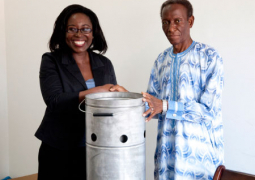A team from the United States Coast Guards International Training Division is holding a two-week advanced boarding officers’ course for 24 Gambia Navy officers.
The gesture forms part of efforts in helping The Gambia safeguard its maritime security, and to make the Gambia Navy a more professional entity capable of protecting the country’s territorial waters.
The course is a followup to last April’s boarding officer course organized by the same training division in continuation of the training cycle.
The training is made possible thanks to the efforts of the US Embassy in
During the two-week intensive course, the 24 officers of the Gambia Navy are expected to cover a wide range of issues, including extensive instruction and practical exercises in subject control techniques, defensive tactics, arrest procedures, use of force, judgmental exercises, and additional boarding exercises.
The course commenced yesterday at the training hall of Gambia Ports Authority in
Gambia Navy officials believe that this advance boarding officers course will give the participants the opportunity to learn new skills, and consolidate the already acquired ones, and will also provide the Gambia Navy the opportunity to train large numbers of its officers.
Officially declaring the training session open, the deputy chief of defense staff of the Gambia armed forces, Major General Ousman Badjie, told navy officers that the advance boarding officers’ course will go long way in equipping them in the execution of their duties.
“This not the first time the US Coast Guards have trained and engage the navy personnel, and the importance of this two-week training cannot be overemphasized, given the growing trend in the maritime sector.” deputy CDS Badjie added.
He added that the navy’s role in protecting the territorial integrity is of paramount importance to the country’s security, adding that the navy has to be professional in dealing with issues including human trafficking, drug trafficking, illegal migration, among others.
“Many use the sea to carry out their illegal practices, and the navy efforts in combating these related crimes is noticeable”, Badjie added.
Major General Badjie re-echoed President Yahya Jammeh’s zero tolerance for drugs and corruption in the country, and said the training course has come at the right time.
Badjie also expressed hope that relations between
Lieutenant Colonel Matthew V. Sousa, United States Cavalry and Chief of Mission Military of United States African Command (AFRICOM) overseeing Senegal, Cape Verde, Gambia and Guinea Bissau, and defense attaché at US Embassy in Banjul encouraged the navy officers to be serious with the training, as it will help them in their professional duties and in safeguarding the waters of The Gambia.
The
Lt Colonel Sousa added that more training for the navy is in the pipeline, and urged the participants to work hard, adding that training is a continuous learning process.
Petty Officer 1st Class Toni Little the US Coast Guard team leader to The Gambia reminded the participants of their mission to The Gambia, which she added is to build their professional capacity in carrying out their duties in the sea and territorial waters.
“We are looking forward to working with you in two weeks. This training is all about information sharing; we will be learning from each others as the course advances”, Toni who has been in US Coast Guard for ten years, told the participants.
The chief of naval staff, Commodore Momodou Senghore, said “with the evolving trends of maritime security threats such as narcotic drug trafficking, illegal migration by boat, human trafficking, arms trafficking, toxic waste dumping, illegal fishing and piracy, amongst others, the need for littoral states to collaborate with partners to enhance capacity and capability in maritime law enforcement to counter such threats has never been greater.”
The navy chief said that boarding a vessel at sea is a risky activity that requires special skills for personal safety, and effective execution of duty.
“It could be by day or night, in calm or rough weather. In some instances, the boarding team is confronted with stiff resistance in open waters by the captain and crew of the vessel to be boarded.”
The skills and techniques acquired during the last program, he added, have been applied during maritime security patrols, and the impact has been significant. It has enhanced the ability of the Gambia Navy boarding teams to safely board and conduct thorough searches on vessels at sea.
The naval chief used the platform to commend the
Read Other Articles In Article (Archive)
A positive sign indeed!
Feb 1, 2016, 10:01 AM


